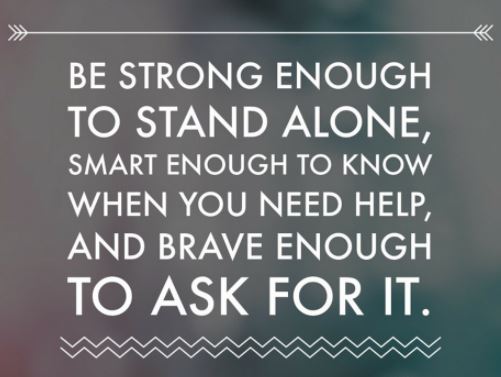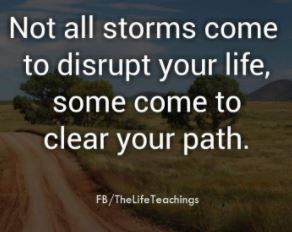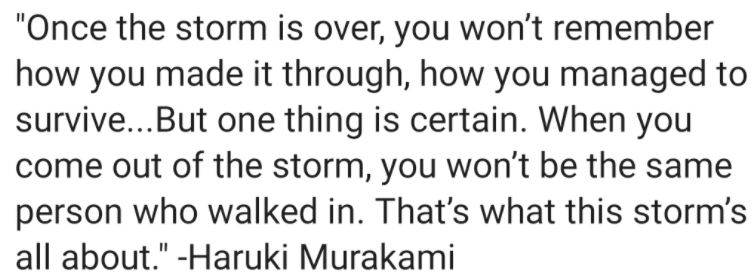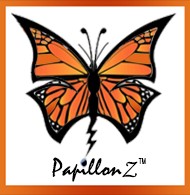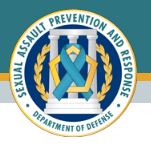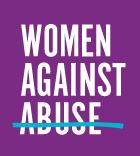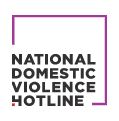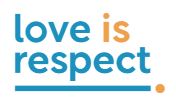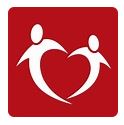Military, Department of Defense & Veterans
Bright Sky can help you:
- Understand what domestic violence can look like
- Spot the warning signs of domestic violence
- Evaluate the safety of a relationship
- Locate the nearest support services across the United States
- Learn how to help a friend, loved one, or colleague that may be affected
If you are in immediate danger, call Military Law Enforcement or CALL 911.
DOMESTIC, DATING AND SEXUAL
VIOLENCE ARE NEVER OKAY.
In general, Hotlines have 3 things in common:
1) available to call 24/7, 365 days | 2) 100% confidential | 3) FREE
- You don’t need to be experiencing a crisis to contact a crisis hotline.
- At most of these hotlines, the volunteers and counselors who answer calls, texts and chat messages are trained to help someone in crisis.
- But you can also reach out if you’re feeling sad, anxious or stressed and don’t know where to turn.
- These hotlines also serve friends, family members and loved ones of someone who is experiencing a mental health crisis, domestic violence, abuse, addiction and many other issues.
- They can also make referrals.
Military Resources
“For 24-hour hotlines and other resources, please see our National Organizations Military page.”
https://www.womenslaw.org/find-help/federal/military
From womenslaw.org –
“This page includes information about reporting and receiving help for domestic violence on military installations and information about military protection orders.
“The Department of Defense’s Family Advocacy Program reviewed this information for accuracy. Inclusion of this information does not imply endorsement of WomensLaw.org by the Department of Defense.”
https://www.womenslaw.org/laws/federal/domestic-violence-military
If you or anyone you know is experiencing abuse, domestic violence,
suicidal thoughts or sexual assault, these are the numbers to call.
There are many hotlines that let you text or
live chat with someone, without ever placing a phone call.
ABUSE | RAPE | SEXUAL ASSAULT
RAINN (Rape, Abuse and Incest National Network)
1-800-656-HOPE (4673)
Available in Spanish | En Español
CHILDREN | TEENS
CHILDHELP NATIONAL CHILD ABUSE HOTLINE
1-800-422-4453
- For issues related to child abuse, Childhelp connects you with a professional counselors to help in a crisis, and provide information on how to get help. They offer phone support in 170 languages.
NATIONAL CENTER FOR MISSING & EXPLOITED CHILDREN
1-800-THE-LOST (24-hour Hotline)
National Center for Missing and Exploited Children: Home (missingkids.org)
NATIONAL RUNAWAY SAFELINE HOTLINE
1-800-RUNAWAY (786-2929)
NATIONAL TEEN DATING ABUSE HOTLINE
1.800.799.SAFE (7233) | Live Chat
Domestic Violence Support | The National Domestic Violence Hotline (thehotline.org)
YOUTHLINE
1-877-968-8491 -or- TEXT teentoteen to 839863
https://oregonyouthline.org/about
- A free 24-hour crisis, support, and helpline for youth.
- YouthLine is a teen-to-teen youth crisis and support service provided by Lines for Life—a non-profit dedicated to preventing substance abuse and suicide.
- YouthLine operates a national helpline that provides crisis support and referrals via call, text, and chat.
- The YouthLine is answered by teen volunteers daily from 4pm-10pm PST (and by adults at all other times!).
- Translation services are available upon request.
CRISIS #’s (Teens Under 18)
Girls and Boys Town 1-800-448-3000
Hearing Impaired 1-800-448-1833
Youth Crisis Hotline 1-800-448-4663
Teen Hope Line 1-800-394-HOPE
CYBERCRIME
CYBER CIVIL RIGHTS INITIATIVE
1-844-878-CCRI (2274)
https://www.cybercivilrights.org
- Posting Nude/Sexual Images Without Consent/”Revenge Porn” is a FEDERAL CRIME.
DOMESTIC ABUSE | VIOLENCE
NATIONAL DEAF HOTLINE
Video phone: 855.812.1001 | Instant messenger: DeafHotline
- Victims of Domestic Violence/Sexual Assault who are deaf or hard of hearing
NATIONAL DOMESTIC VIOLENCE HOTLINE
1-800-799-SAFE (7233)
Domestic Violence Support | The National Domestic Violence Hotline (thehotline.org)
- Anyone who is experiencing domestic violence and/or abuse, plus anyone concerned about a friend, family member or loved one can call the National Domestic Violence Hotline (NDVH) 24 hours a day, seven days a week.
- They offer support in more than 200 languages, and offer a confidential, secure online chat.
NATIONAL TEEN DATING ABUSE HOTLINE
1.800.799.SAFE (7233) | Live Chat
Domestic Violence Support | The National Domestic Violence Hotline (thehotline.org
Advocates and Shelters | WomensLaw.org (drop-down menu for your State)
Click here to enter your zip code:
Find Domestic Violence and Abuse Help, Information and Stats (domesticshelters.org)
Domestic Violence Support | The National Domestic Violence Hotline (thehotline.org)
National Organizations | WomensLaw.org (listed by subject matter)
Chat Rooms and Message Boards | WomensLaw.org
VictimConnect (victimconnect.org serves victims of crime in US (including assault, abuse,
domestic violence, teen dating violence, trafficking, stalking, etc.), and make local referrals
SUICIDE PREVENTION | MENTAL HEALTH CRISIS
If you feel like you or someone you know is in immediate danger,
you should call 911 or go to an emergency room to get immediate help.
Explain that it is a psychiatric emergency and
ask for someone who is trained for these kinds of situations.
Crisis Text Line
Text Hello to 741741
https://www.crisistextline.org/
- Crisis Text Line fields messages about suicidal thoughts, abuse, sexual assault, depression, anxiety, bullying and more. What makes it unique is that it’s entirely text-based, which makes it easy for anyone who doesn’t feel comfortable or safe talking on the phone to use it.
- You can text 741741 in the US or UK (686868 in Canada), or message Crisis Text Line on Facebook for help. You’ll be matched with a volunteer counselor, who is supervised by a licensed, trained mental health professional.
IMAlive
Click for Live Chat with a trained and certified Crisis (Suicide) Intervention Specialist
MENTAL HEALTH AMERICA
1-(800) 969-6MHA In crisis? Call: 1-800-273-TALK
NATIONAL HOPELINE NETWORK, SUIDICE & CRISIS HOTLINE
1-800-442-HOPE (4673)
- Hopeline provides support with trained counselors through this national hotline to prevent suicide.
NATIONAL SUICIDE PREVENTION HOTLINE
1-800-273-TALK (8255) | Spanish HOTLINE 1-888-628-9454 | TTY: 1-800-799-4TTY (4889)
https://www.suicidepreventionlifeline.org
- The National Suicide Prevention Hotline fields calls 24/7 for anyone with suicidal thoughts or who are in crisis. They offer help for Spanish-speakers and anyone who is deaf or hard of hearing. Their website also offers many resources to get help for yourself or someone you know.
SAMHSA’s NATIONAL HELPLINE
1-800-662-HELP (4357)
https://www.samhsa.gov/find-help/national-helpline
- “Substance Abuse and Mental Health Services Administration” -US Dept. of Health & Human Services)
TREVOR LIFELINE (LGBTQ+ Youth)
1-866-488-7386 -or- TrevorText – Text START to 678-678
https://www.thetrevorproject.org
- LGBTQIA+ kids and teens can reach out to The Trevor Project for support during a crisis, if they are feeling suicidal or need a safe space to talk about any issue.
- You can also chat via their website or by texting START to 678678.
TEEN DATING VIOLENCE
NATIONAL TEEN DATING ABUSE HOTLINE
1.800.799.SAFE (7233) | Live Chat
Domestic Violence Support | The National Domestic Violence Hotline (thehotline.org)
TRAFFICKING (IN PERSONS)
BILATERAL SAFETY CORRIDOR COALITION 24-HOUR EMERGENCY TRAFFICKING HOTLINE
(US Southern Border & Mexico)
1-619-666-2757
NATIONAL HUMAN TRAFFICKING HOTLINE
1-888-373-7888 | TEXT 233-733
https://www.humantraffickinghotline.org
VICTIMS’ ASSISTANCE
NATIONAL ORGANIZATION FOR VICTIMS ASSISTANCE (NOVA)
1-800-879-6682
VICTIM CONNECT RESOURCE CENTER
Phone or text: 1-855-4-VICTIM (1-855-484-2846)
Advocates and Shelters | WomensLaw.org (drop-down menu for your State)
Click here to enter your zip code:
Find Domestic Violence and Abuse Help, Information and Stats (domesticshelters.org)
Domestic Violence Support | The National Domestic Violence Hotline (thehotline.org)
National Organizations | WomensLaw.org (listed by subject matter)
Chat Rooms and Message Boards | WomensLaw.org
VictimConnect (victimconnect.org serves victims of crime in US (including assault, abuse,
domestic violence, teen dating violence, trafficking, stalking, etc.), and make local referrals
Additional Resources
- Advocates and Shelters | WomensLaw.org (drop-down menu for your State)
- Click here to enter your zip code: Find Domestic Violence and Abuse Help, Information and Stats (domesticshelters.org)
Domestic Violence Support | The National Domestic Violence Hotline (thehotline.org)
- National Organizations | WomensLaw.org (listed by subject matter)
- Chat Rooms and Message Boards | WomensLaw.org
- VictimConnect (serves victims of crime in US (including assault, abuse, domestic violence, teen dating violence, trafficking, stalking, etc.), and make local referrals.
Mental Health Resources
- Hotline Numbers
- Mental Health Support, Resources & Information | HealthyPlace
- HelpGuide.org
- National Alliance on Mental Illness (NAMI) – by State List
- Mental Health America (MHA) – by State List
- More Information on Mental Health – By Topic
If you or anyone you know is experiencing abuse, domestic violence,
suicidal thoughts or sexual assault, these are the numbers to call.
There are many hotlines that let you text or
live chat with someone, without ever placing a phone call.
Just a note: These are resources that we came across that may prove helpful to you.
Please understand, we ARE NOT recommending or endorsing any of them.
It is up to you to determine if they offer something you need and whether or not it is appropriate for your situation.
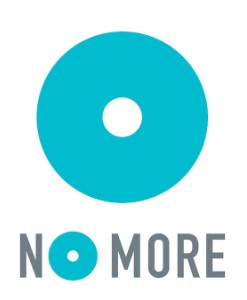
“With more than 1,400 allied organizations and over 40 state, local, and international chapters, NO MORE sparks grassroots activism, encouraging everyone—women and men, youth and adults, from all walks of life—to be part of the solution.” Click Here to learn more about NO MORE, and here How to Help Survivors
The NO MORE Silence, Speak Your Truth platform provides a safe and supportive space for people impacted by domestic violence to share their experiences, learn from other survivors, and connect to resources.
“Your story is personal and unique, but sharing it can be a healing experience for you and others.
Remember, healing is not linear and is different for everyone. It is important to stay patient with ourselves when setbacks occur in our process and forgive yourself for everything that may go wrong along the way.”
“NO MORE is a groundbreaking, global initiative comprised of the largest coalition of nonprofits, corporations, government agencies, media, schools, and individuals addressing domestic and sexual violence. We are committed to engaging, reaching, and working with people from diverse communities.” Click Here to GET HELP – Directory of domestic & sexual violence helplines & services ~ 200+ LOCATIONS AROUND THE WORLD!
A Voice for the Innocent
A Voice For The Innocent is a safe, anonymous online community of support for victims of rape and sex abuse.
Join A Voice For The Innocent to share your support, or to share your story.
About
Blog Articles
Read Stories
Tell Your Story
Military, Department of Defense & Veterans

SAFE HELPLINE
1-877-995-5247
Department of Defense (DoD) Safe Helpline is a groundbreaking crisis support service for members of the DoD community affected by sexual assault.
Safe Helpline provides live, one-on-one support and information to the worldwide DoD community.
The service is confidential, anonymous, secure, and available worldwide, 24/7 by click, call or text — providing victims with the help they need anytime, anywhere.
What is the Safe Helpline app?


The Safe Helpline app is a free mobile resource created to meet the unique needs of members of the Department of Defense community affected by sexual assault. By downloading the app, you can access 24/7 support through Safe Helpline’s Telephone and Online Helplines, get information and resources to help address the short- and long-term effects of sexual assault, as well as practical exercises, to help you manage your self-care. We also recognize that for many survivors stationed outside of the United States (OCONUS) additional limitations may arise when accessing resources, which is why the Safe Helpline app has been designed to give survivors access to a variety of support services and self-care exercises in a free, and convenient way.
SAPRO 1-571-372-2657 –
(8:00am-5:00pm Eastern)
The US DoD Sexual Assault Prevention and Response Office (SAPRO) is responsible for oversight of the Department’s sexual assault policy.
SAPRO works hand-in-hand with the Services and the civilian community to develop and implement innovative prevention and response programs.
https://www.womenslaw.org/find-help/federal/military
From womenslaw.org –
“This page includes information about reporting and receiving help for domestic violence on military installations and information about military protection orders.
“The Department of Defense’s Family Advocacy Program reviewed this information for accuracy. Inclusion of this information does not imply endorsement of WomensLaw.org by the Department of Defense.”
https://www.womenslaw.org/laws/federal/domestic-violence-military
Intimate Partner Violence Assistance Program (IPVAP)
“The Department of Veterans Affairs has an Intimate Partner Violence Assistance Program that is committed to helping veterans, their partners, and VA staff who are impacted by intimate partner violence. You can find a directory of IPV Assistance Program Coordinators on their website.”
Military OneSource
“The Department of Defense manages Military OneSource, a website for soldiers and families of soldiers. Military OneSource also maintains information about the Family Advocacy Program with locations across the United States providing services to military families dealing with family violence. You can search here to find a FAP location at your installation.”
K9S FOR WARRIORS
https://www.k9sforwarriors.org
“K9s For Warriors is ending veteran suicide and returning our Warriors to a life of dignity and independence. We rescue and train shelter dogs to be paired as Service Dogs for Warriors with service-connected Post-Traumatic Stress, Traumatic Brain Injury and/or Military Sexual Trauma.
“We are the nation’s largest provider of Service Dogs for disabled American veterans.”
From the Founder Shari Duval: “Service canines, properly trained, are a profound alternative for recovery from PTSD and TBI. We have been honored to serve these brave men and women that have given this country so much. There is no charge for our service; it is our duty, honor and privilege. For three weeks our warriors live at our facility where they train and learn to re-enter civilian life. We are a small charity doing huge work and making a difference. Our men and women of our military fought for our tomorrows, so we fight for theirs.”
Military OneSource
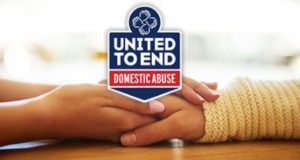
Connecting with confidential help is simple with Military OneSource. You can reach us anytime, 24/7 using the phone numbers or tools below. You can see your options by hovering over the Confidential Help tab in the main menu at the top of each page. Or, you can also click on Confidential Help in the menu to learn more about how we can help.
Toll-Free: 800-342-9647
En español llame al: 800-342-9647
TTY/TDD: Dial 711 and give the toll-free number 800-342-9647
Live chat
Live chat is a convenient way for you to get the information you need from Military OneSource. Type in your question and receive a quick response from a Military OneSource consultant. Live chat is available 24/7/365 from the convenience of your computer, smart phone or tablet device. To access live chat, scroll to the top of any page on the website and click on the comment bubble icon.
Speak With a Consultant
International dialing instructions
Each country has a different set of instructions for making international calls. Visit the International Dialing Instructions page for instructions by country.
Calling from your computer? (VoIP)
Visit the Voice over Internet Protocol (VoIP) page.
When it comes to domestic abuse, everyone’s situation is different — it can happen to anyone and is not their fault. The Family Advocacy Program is committed to supporting service members and their families impacted by domestic abuse through victim advocacy and crisis intervention.
Domestic Abuse Help for the Military Community | Military OneSource
Find the Right Help
Military OneSource can link you to resources and support, including help finding your local Family Advocacy Program. Your local FAP staff can help you understand options for reporting, document your abuse, create a safety plan and maintain a network. Whenever you want to explore next steps, or learn about options for support, we can find the right help for you.
Feeling Unsafe at Home? You Have Options for Getting Help:
- Learn about your reporting options
- Connect with a victim advocate
- Start documenting your abuse
- Create a safety plan
- Maintain a support network
- You can always call one of these trusted sources.
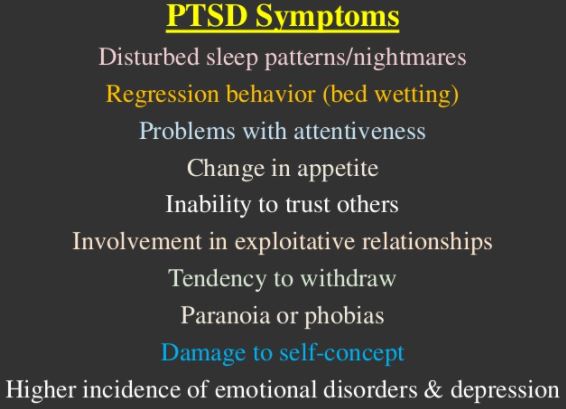
National Center for PTSD offers Veterans Affairs (VA) resources for Women in the Army.
GET HELP FOR PTSD If you need help right away:
- Call 1-800-273-8255
Press “1” if you are a Veteran. - Chat online with a counselor
- Call 911 or visit a local emergency room
- Call 1-800-273-8255
PTSD Information Voice Mail: (802) 296-6300 | ncptsd@va.gov
Also see: VA Mental Health
The Journey
Each fall, the Monarch Butterflies in Maine begin an unbelievable Journey to a hilltop in Mexico.
How do they do it?
They focus on the Goal, not the Difficulties.
Each day they take their bearings and set off, allowing their Instincts and Desire to steer them.
They Accept what comes ~
Some winds blow them off course,
Others speed them along.
But, they keep flying. . .
Until. . .
One day. . .
They Arrive!
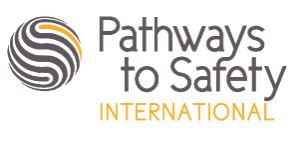
PATHWAYS TO SAFETY HOTLINE
1-833-723-3833
“Pathways to Safety International serves people of all genders, races, ethnicities, religions, abilities, age and their pets who are victims/survivors of gender based violence, including sexual assault, domestic violence, stalking and forced marriage abroad.” (includes overseas military victims)
Email:crisis@pathwaystosafety.org
“Pathways to Safety International offers a continuum of culturally sensitive services. PSI provides long term case management from advocates with intercultural backgrounds and experience working with sexual violence survivors, who have been specifically trained and are knowledgeable on the additional obstacles that American survivors overseas face.
PSI’s advocates will assist with international danger to safety relocation, specialized international safety planning, referrals to seasoned international family law attorneys experienced with the Hague and international child custody cases, international transition services, and assistance with housing and other basic needs when a survivor has left their abuser, it may be back in the United States or in another area of the world.”
Special populations served are overseas military victims, victims with disabilities, LGBTQIA victims aboard, and immigrants and refugees (both American survivors immigrating abroad and foreign-born survivors immigrating to the U.S. with an American spouse or children who face additional barriers and obstacles).”
Email:crisis@pathwaystosafety.org
PROTECT OUR DEFENDERS
Protect Our Defenders
950 N. Washington Street
Alexandria, VA 22314
Email: info@protectourdefenders.com
Protect Our Defenders (POD) is the only national organization solely dedicated to ending the epidemic of rape and sexual assault in the military and combating a culture of pervasive misogyny, sexual harassment, and retribution against survivors.
POD supports survivors of military sexual assault and sexual harassment, including service members, veterans, and civilians assaulted by members of the military.
WHO WE SERVE
PROTECT OUR DEFENDERS serves those who have been affected by Military Sexual Violence, Victim Retaliation, Misogyny, Sexual Prejudice, and Racism regardless of Sexual Orientation, Gender Identity, Religion, Race, Ethnicity, National Origin, Age, Disability, or any other Uniquely Defining Attribute.
Survivor Support Network | Protect Our Defenders
Resources on the website include:
- hotlines
- applications for free legal services
- directories for local services
- peer-to-peer support
- resource libraries
- Forums
- Military Sexual Assault Fact Sheet Military Sexual Assault Fact Sheet | Protect Our Defenders

VETERANS CRISIS LINE
1-800-273-8255 Press 1
VETERANS STRESS PROJECT 707-237-6951
They can help significantly reduce PTSD in six (6) hours. https://www.stressproject.org
“The Veterans Stress Project is determined to make a difference. Through this web site, we offer returning vets free or low-cost sessions using Energy Psychology, a method which many therapists and coaches are using to help veterans with PTSD to get their lives back.
To see television news stories about our work, and videos of veterans using EFT, the most popular Energy Psychology method, visit this page.
“The Veterans Stress Project is an initiative of the National Institute for Integrative Healthcare (NIIH), a nonprofit research and teaching institution not affiliated with the government or any religious group. NIIH has conducted many scientific studies of EFT.
This research shows that 8 out of 10 veterans who come to this site for help, and complete 6 one-hour EFT sessions, no longer test positive for PTSD. They get better, and stay better over time.
You can click here to read the story of an Iraq vet with PTSD whose symptoms disappeared dramatically and quickly after treatment with EFT.
“NIIH and the Veterans Stress Project have worked closely with the VA’s Office of Cultural Transformation and Patient Centered Care to bring evidence-based energy therapies to veterans. As a result of 8 randomized controlled trials showing that EFT reduces PTSD symptoms by over 50%, in 2017 EFT was approved by the VA as a “generally safe therapy.”
This has allowed many VA therapists to offer EFT to their clients.
If you’re a vet, ask for EFT at your Vet Center or VA Hospital.”
About WomensLaw.org
(En Español)
Despite its name, WomensLaw.org provides information that is relevant to people of all genders, not just women. Our Email Hotline will provide legal information to anyone who reaches out with legal questions or concerns regarding domestic violence, sexual violence, or any other topic covered on WomensLaw.org.
About Abuse
These pages provide an overview of domestic violence and sexual assault as well as more detailed information about specific forms of abuse.
- Am I Being Abused? (Danger Assessment; Signs of Abuse)
- Forms of Abuse (Abuse Using Technology; Domestic Violence/Teen Violence; Emotional Abuse; Financial Abuse; Reproductive Abuse & Coercion; Sexual Abuse & Exploitation; Stalking & Cyberstalking; Litigation Abuse)
- Abuse in Specific Communities (Abuse Among People Living with AIDS/HIV; Abuse in Immigrant Communities; Abuse in Tribal Communities; Information for Teens & Young Adults; LBGTQIA Victims; Male Victims; Abuse in Jewish Community; Elder Abuse
- Safety Tips (Domestic Violence Victims; Stalking Victims; Safety Planning with Children; Safety in a Confidential Address; Safety in Court; Safety in Rural Areas; Safety While Using the Internet; Safety While Using Social Media
- In the Workplace (Sexual Harassment by a Co-Worker or Boss; Workplace Restraining Orders (filed by Employer)
Find Help (US Map)
Find Help for Yourself and for Others | WomensLaw.org
Click on your state (in the map or in the drop-down menu) to find contact information for:
- advocates in local domestic violence programs and shelters;
- legal assistance organizations;
- courthouse locations where you can file for a protection order; and
- sheriff departments. If you need to talk to someone about an abusive relationship, you can call the National Domestic Violence Hotline at 1-800-799-7233.
Legal Information (US Map)
Legal Information | WomensLaw.org
- Know the laws – By State
- Preparing for Court – By Yourself
- Immigration
- Federal Gun Laws
- Domestic Violence in the Military
- Videos
Military
“For 24-hour hotlines and other resources, please see our National Organizations Military page.” https://www.womenslaw.org/find-help/federal/military
From womenslaw.org –
“This page includes information about reporting and receiving help for domestic violence on military installations and information about military protection orders.
“The Department of Defense’s Family Advocacy Program reviewed this information for accuracy. Inclusion of this information does not imply endorsement of WomensLaw.org by the Department of Defense.”
https://www.womenslaw.org/laws/federal/domestic-violence-military
Helping Others
Helping Others | WomensLaw.org
- Family, Friends, Co-Workers
- Advocates
- Lawyers
- Doctors, Healthcare Professionals
- Salon Professionals
Womens Law Email Hotline: WomensLaw.org Email Hotline
Other Helpful Information:
Advocates and Shelters | WomensLaw.org (drop-down menu for your State)
National Organizations | WomensLaw.org (listed by subject matter)
Chat Rooms and Message Boards | WomensLaw.org
There are a variety of support services available to victims of domestic violence and sexual assault on the Internet. We have listed some of these resources.
DASH
Domestic Abuse Survivor Help offers peer support to individuals in abusive relationships and in relationship abuse recovery.
OUR MISSION
… to create freedom from domestic abuse for everyone, in whatever form that takes for them, shining a guiding light with the wisdom of our own experience as survivors.
We value:
- Self-direction, understanding that people are the experts in their own lives;
- Support without judgment;
- Empathy and compassion for each person’s struggle;
- Deep understanding of the dynamics of power and control.
WHAT WE DO
- are ready to get out of an abusive relationship.
- need to stay in an emotionally abusive relationship for now.
- feel like they’re stuck in the abusive relationship forever.
- left an abusive relationship and want help healing from relationship abuse.
WHY WE DO THIS
WHO WE ARE
HOW IT WORKS
- Read the details.
- Submit the request form.
- We’ll assign you a mentor.
- You’ll get an email from your peer support mentor.
- If your mentor is a good fit for you, that’s great! If not, we’ll pair you with a different mentor.
Want to be a peer support mentor?
- Read the details.
- Submit the application.
- Go through training and get to know other mentors.
- Receive emails with survivor recommendations.
- You decide when to take on survivors and how many to mentor at a time.
- Reach out to your survivor(s) via email as needed.
WHEN WE’RE AVAILABLE
WHERE WE WORK
HELP TO HEAL FROM RELATIONSHIP ABUSE
DomesticShelters.org
Click Here to enter your zip code to start your search for domestic violence programs and shelters near you.
Domestic Violence in the Military (domesticshelters.org)
DomesticShelters.org provides
- Answers to common and frequently asked questions (Answers to Most Commonly Asked Domestic Violence Questions (domesticshelters.org)
- 849 Articles on 34 topics ranging from “After Abuse” to “Ending Domestic Violence” to “Your Voice” (https://www.domesticshelters.org/articles/)
- Helpful Videos for Domestic Violence Victims & Survivors (Helpful Videos for Domestic Violence Victims and Survivors (domesticshelters.org)
- Resources
HealthyPlace
Mental Health Support, Resources & Information | HealthyPlace
“Healthyplace.com is the largest consumer mental health site on the net. We provide authoritative information and support to people with mental health concerns, along with their family members and other loved ones.
“At HealthyPlace.com, you’ll find comprehensive, authoritative information on psychological disorders, psychiatric medications, and other mental health treatments. We also have online psychological tests, breaking mental health news, and more.
“We believe the most important thing in a person’s life is “peace of mind”.
“And at HealthyPlace.com, we help bring that to you by providing mental health information from experts, as well as everyday people who are dealing with psychological disorders.
Learn More About HealthyPlace.com | HealthyPlace
On About Us, you will see a list of Conditions from “Abuse” to “Schizoaffective Disorder” which link to those Communities where you can find “tons” of valuable information, articles, books, and videos. (Some links are provided below for your convenience.)
They also have many, many Mental Health BLOGS! Including:
Mental Health for the Digital Generation | Trauma/PTSD | Verbal Abuse in Relationships (includes an article How Abuse Can Lead to Suicidal Thoughts | HealthyPlace)
Mental Health Support, Resources & Information | HealthyPlace
Conditions include:
- Abuse Information & Resources (Abuse Information, Emotional & Psychological Abuse, Physical Abuse, Domestic Violence, Teenage Dating Violence, Help)
- Addictions
- Anxiety, Panic, Phobias
- Depression (Types, Treatment, Self-Help)
- Dissociative Disorders (Types, Causes, Symptoms, Treatment)
- LGBT & Mental Health (much more, including links to many Psychological Tests)
- Self-Help
From Healthyplace.com
Rape victim stories can be very difficult to read, frightening and emotionally draining for some but stories of rape show other victims that they are not alone in their struggles. Rape stories detail the many abuses that some people suffer and yet survive and go on to succeed in recovering and regaining control of their lives. Rape victim stories can help others to realize that there are other survivors that have been through exactly what they have and come out the other side a whole person.
The following rape stories contain scenes of abuse, sexual assault, incest and violence. The people in these rape victim stories have been badly wounded by these events and yet have the courage to stand up and say what has happened to them. Each of these rape stories speaks to the courage of the person who has shared it.
https://www.healthyplace.com/abuse/rape/rape-victim-stories-real-stories-of-being-raped
Rape Stories from Real People
- Sexual Assault, Rape Survivor Stories
- After Life of Sexual Abuse, Going to Police Turns into Nightmare
- Incest Paves the Way for Adult Rape
- A Wife Escapes Her Rapist, Abusive Husband
- Incest Survivor Considers Herself a ‘Second Time Virgin’
- Stranger Rape Survivor Tells Others to ‘Think Straight’
- Rape Victims Wishes She Had Gone to the Police
- Younger Rapist Terrifies Older Victim Into Silence
- Abusers Induce Multiple Miscarriages After Victim Gets Pregnant
- Incest, Rape Survivor Proclaims She Will Heal From Abuse
- Multiple Rape Survivor Knows She’s Strong and Proud
- Young Girl Raped by ‘Friend’ and Called a Whore
- Rape Survivor Wakes Up and Realizes It Isn’t Her Fault
- Survivor Takes Three Years to Tell Date Rape Story
- Rape Survivor Knows It Isn’t Her Fault
Click Here for Resources – Mental Health & Crisis
Click here for Resources – ONLINE THERAPY (Many are FREEE!!)

HelpGuide helps you help yourself
HelpGuide is a small independent nonprofit that runs one of the world’s top 10 mental health websites. Over 50 million people from all around the world turn to HelpGuide each year for trustworthy content they can use to improve their mental health and make healthy changes.
In Memory of Morgan Segal
“HelpGuide is dedicated to Morgan Leslie Segal, whose tragic suicide might have been prevented if she had access to better information.”
“Following Morgan’s death, her parents Robert and Jeanne Segal began sharing their grief and discovered that all too many others had experienced similar struggles. “The pain was so evident,” said Robert, “the subject so frightening, hidden, and loaded with stigma, that they don’t know where to turn.” They concluded that the best way to honor the memory of their daughter was by helping people in similar trouble by guiding them toward appropriate information and care.
“And so HelpGuide was born.”
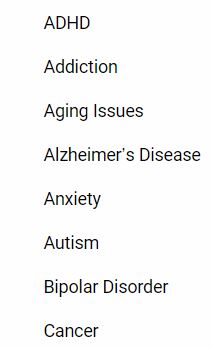
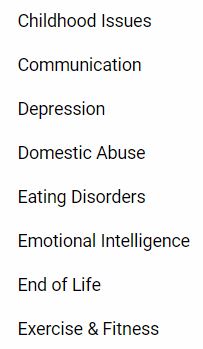
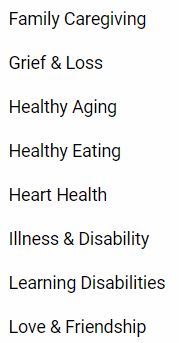
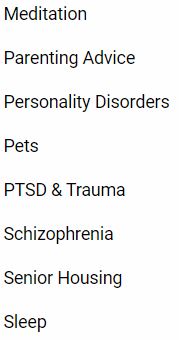
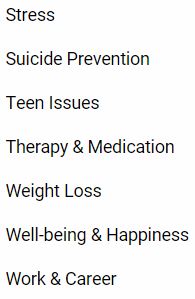
Victim Connect
HOTLINE: Phone or text: 1-855-4-VICTIM (1-855-484-2846)
If this is an emergency, please call 911.
“A program of the National Center for Victims of Crime, it combines:
- A traditional telephone-based helpline: 855-4-VICTIM (855-484-2846)
- An innovative online chat: Chat.VictimConnect.org
- Web-based information and service referrals: VictimConnect.org
“With extensive specialized training, our Victim Assistance Specialists stand ready to help crime victims.”
“National hotlines can help connect victims, survivors, and their support networks connect with local resources. The VictimConnect Resource Center is one of several other national hotlines that are dedicated to helping victims understand their rights and options, and make the choices that will best support their recovery.
“We suggest you choose the hotline that is best for you. If you aren’t sure which helpline, the VictimConnect Resource Center can speak with you about which helpline might fit your needs and what your other options are.”
Who do we serve?
The VictimConnect Resource Center serves victims of crime in the United States. Our services are specifically designed to refer victims to the most appropriate local or national resources based on their experiences and needs. Our most served crimes are:
- Sexual Assault (including campus)
- Assault/Attempted Homicide
- Domestic/Dating Violence (and/or protective order violations)
- Homicide
- Financial Crimes (Identity Theft, Fraud and/or Exploitation)
- Hate Crimes
- Human Trafficking (labor and sex)
- Stalking
- Mass Events
- Elder Abuse or Neglect
- Child Abuse (Physical, Sexual, and/or Neglect)
Online Safety
Women Against Abuse
INTERNET SAFETY
Technological advances have allowed intimate partner violence to take new forms, including access to private information, control over online accounts, and the use of electronic devices to track one’s whereabouts.
If you are seeking information about domestic violence and ways to get help, it is possible your partner can track this information.
It is vital to protect your online activities and understand the ways in which technology may compromise your safety.
Your online activity can be monitored through a number of ways, including spyware, hacking, and keystroke loggers. Even if you are careful about deleting your browser history, it is still possible for someone to gather information about what you are doing with your computer.
Whether or not someone has direct access to your computer, it is still possible for them to remotely hack into your computer.
Please review the following tips and information from the National Network to End Domestic Violence:
- If you think your activities are being monitored, they probably are. Abusive people are often controlling and want to know your every move. You don’t need to be a computer programmer or have special skills to monitor someone’s computer and Internet activities—anyone can do it and there are many ways to monitor with programs like Spyware, keystroke loggers and hacking tools.
- It is not possible to delete or clear all the “footprints” of your computer or online activities. If you are being monitored, it may be dangerous to change your computer behaviors such as suddenly deleting your entire Internet history if that is not your regular habit.
- If you think you may be monitored on your home computer, be careful how you use your computer since an abuser might become suspicious.
- You may want to keep using the monitored computer for innocuous activities, like looking up the weather. Use a safer computer to research an escape plan, look for new jobs or apartments, bus tickets, or ask for help.
- Email and Instant/Text Messaging (IM) are not safe or confidential ways to talk to someone about the danger or abuse in your life. If possible, please call a hotline instead. If you use email or IM, please use a safer computer and an account your abuser does not know about.
- Computers can store a lot of private information about what you look at via the Internet, the emails and instant messages you send, internet-based phone and IP-TTY calls you make, web-based purchases and banking, and many other activities.
- It might be safer to use a computer in a public library, at a trusted friend’s house, or an Internet Café.
The above information is taken from the National Network to End Domestic Violence, Internet and Computer Safety page.
In addition, learn about Facebook safety with the Privacy and Safety on Facebook guide from the National Network to End Domestic Violence!
Internet Safety
Web Browsers store a history of all the pages you visit during your time on the Internet. It is imperative that you remove this information from your computer so that an abuser cannot discover it. Please remember to do this procedure before you log off the Internet.
CAUTION: If you are using your abuser’s computer, you may be leaving a trail that can be traced to this web site. Be sure to clear the view history of the web browser when you are through.
Instructions for Clearing the View History in your Web Browser:
Using the toolbar of your web browser, find the menu selection that gives you view options.
- Microsoft Internet Explorer: Use the View button, then select Options, then Navigation. In the History section, select Clear History, then OK.
- Netscape Navigator: Use the Options button, then select Network Preferences, then both Clear Memory Cache and Clear Disk Cache, then OK.
- Firefox: Open the Tools menu, then select Options. Open the Privacy tab and select “Cache” sub-category. Click the “Clear” button and then click OK to clean cache.
- AOL: Click on the Members menu, click on Preferences click on the www icon; select Advanced and then Purge Cache.
Be aware that this is not foolproof. An observant computer user may notice that the history is gone, and get suspicious.
If you feel you may be at risk if your abuser discovers you were using the Internet, call 911 or RAINN at 1.800.656.HOPE, The Rape, Abuse & Incest National Network.
(Source: aftersilence.org
“The above information has been adapted from mcleancountyil.gov, and is provided for guidance only.”)
Internet Safety – The Hotline
Call 1.800.799.SAFE (7233)
Internet Safety
Stay safe. Stay connected.
Technology and the Internet are powerful tools for anyone experiencing domestic violence. They can be essential resources to access help and information, and valuable platforms to connect with friends, family members, advocates, and service providers.
Unfortunately, they can also be used by abusive partners to begin, continue, or escalate abuse, making it all the more important to ensure your safety online.
Read more at Internet Safety – The Hotline
Love is respect
Call 1.866.331.9474
- Text: LOVEIS to 22522
- Live Chat
Safety online – love is respect
Most of us spend a lot of time online. Pretty much everything we do can now be done on the Internet, including accessing information, keeping in touch with others, and getting help when we need it. Unfortunately, such frequent use (and the ways in which information is collected every time we go online) means partners who are abusive have more ways than ever to access your information and monitor your movements and behaviors.
Remember:
- Your computer and cell phone use can be monitored without you knowing it.
- Your history can never be completely erased from a computer or device, even if you browse in “private” or “incognito” mode.
- Email can be intercepted like physical mail.
- Global Positioning System (GPS) trackers can be placed in your car or on items like your purse or cell phone.
- love is respect advocates are available 24/7 to help you identify ways to take extra precautions when using technology.
Always remember to keep your safety in mind when contacting love is respect and accessing our services.
Be sure to clear any websites you wouldn’t want your partner to see from your browser history, especially after visiting this website.

Keep your Online Life Private.
This is definitely hard to do with Facebook, Instagram, Twitter, and the self-disclosure they all promote. You may already know by now that putting your address on the Internet is incredibly dangerous, but also think twice about sharing your current location.
Kristin Jackson once saw an Instagram public post with the caption that read, “So drunk, must get home,” and she had tagged her location!
Try to refrain from tagging your location every time you post, and definitely use the privacy options to your advantage. If anything, it will keep you safe and give you an element of mystery.
Source:
Jackson, Kristin Collins. https://www.bustle.com/articles/32325-10-ways-to-help-protect-yourself-from-sexual-assault-even-though-you-shouldnt-have-to. “10 Ways to Help Protect Yourself From Sexual Assault — Even Though You Shouldn’t Have To.” (Sept. 25, 2014.)
Cyber Civil Rights Initiative
HOTLINE: 1-844-878-CCRI (2274)
Posting Nude/Sexual Images Without Consent
(“Revenge Porn” ) is a FEDERAL CRIME.
Cyber Civil Rights Legal Project
“The Cyber Civil Rights Legal Project helps victims of nonconsensual pornography by providing them legal assistance on a pro bono basis. The Cyber Civil Rights Legal Project is founded on the principle that people have a right of privacy in their intimate photographs and videos, and that the public, online dissemination of that media without consent is an invasion of that sexual privacy amounting to a “cyber civil rights” violation.”
US Attorneys who are providing pro bono legal assistance: https://www.cybercivilrights.org/professionals-helping-victims
LEGAL NOTICE:
Revenge porn is becoming (OR has already become) a federal crime as the SHIELD Act has been passed. The SHIELD Act is an amendment to the Violence Against Women Reauthorization Act of 2021.
The Violence Against Women Reauthorization Act of 2021 criminalizes the nonconsensual distribution of nude or sexually explicit images. Offenders could be imprisoned for up to two years.
“For victims of nonconsensual pornography, technology today makes it possible to destroy a person’s life with a single click,” Rep. Jackie Speier, D-Calif., said in a statement. Speier continued, “The damage caused by these attacks can crush careers, tear apart families, and, in the worst cases, has led to suicide.”
For Parents, Family Members, Teachers, Educators, Young Adults & Teens
Internet Safety for Kids | How to Keep Your Kids Safe Online
(Source: Consumernotice.org | Written By : Terry Turner | Edited By : Kim Borwick | Last Modified: August 18, 2021)
Threats to children’s internet safety include invasions of privacy, cyberbullying, sexting and harassment. Options to protect your children include parental controls, apps and tracking software. But the most effective way to keep your kids safe is to talk with them about online risks, how to avoid them and how they can come to you when something goes wrong.
Internet safety for kids depends on parents being aware of online risks and understanding how to help their children and teens avoid them.
Almost every American child and teen has access to the internet. They socialize in online games or on smartphones just as they would on a playground. They live largely in a digital community. But like any community, there are risks and dangers.
Parents are the best suited to monitor kids’ online activity. They are also the most trusted adults most kids will turn to if they experience online dangers. Understanding what your children or teens do online is vital to protecting them from digital threats. . .
What Are Kids Doing Online?
~ 30 percent have used the internet in ways their parents wouldn’t approve
~ 21 percent have visited sites where they can chat with strangers
~ 17 percent have visited porn sites
~ 11 percent have visited sites that offer ways to cheat on homework
~ 4 percent have visited online gambling sites
Source: Children’s Internet Usage Study, Center for Cyber Safety and Education (Grades 4-8)
TOPICS in article:
♦ How Children and Teens Get Online
♦ Online Dangers to Discuss with Your Kids
♦ How to Set Rules
♦ Steps You Can Take to Protect Your Children Online
♦ Using Tech and Apps to Protect Your Kids Online
♦ Monitoring, Tracking and Limiting Your Child’s Online Activity
♦ Filtering Out Inappropriate Content
♦ How to Teach Your Kids to Use Their Smartphones Responsibly
♦ Your Child’s First Smartphone | 5 Things to Think About
♦ Make Sure Your Teen Understands the Dangers of Texting and Driving
♦ Teaching Your Teens How to Use Social Media Safely
♦ Tips for Teen Safety on Social Media
♦ Cyberbullying Prevention
♦ Signs Your Child Is Being Cyberbullied
♦ What Parents Can Do to Deal With Cyberbullies
♦ Teach Your Child How to Stand Up for Cyberbully Victims
♦ How to Talk to Your Teens About Sexting | 5 Things to Tell Your Teens About Sexting
♦ What You Should Know About Your Kids and Online Gaming
♦ How to Keep Your Child Safe in Online Gaming
♦ What to Do If Your Child’s Safety Is Threatened Online
Student Safety
https://www.rainn.org/safety-students
Safety & Prevention
https://www.rainn.org/safety-prevention
Online Safety
Safe Web Browsing
Social Media Safety
Online Dating and Dating App Safety Tips
https://www.rainn.org/online-dating-and-dating-app-safety-tips#overlay-context=
DID YOU KNOW…
YOU CAN DOWNLOAD A TECH SAFETY APP
TO PROTECT YOUR TECHNOLOGY, PRIVACY AND SAFETY!
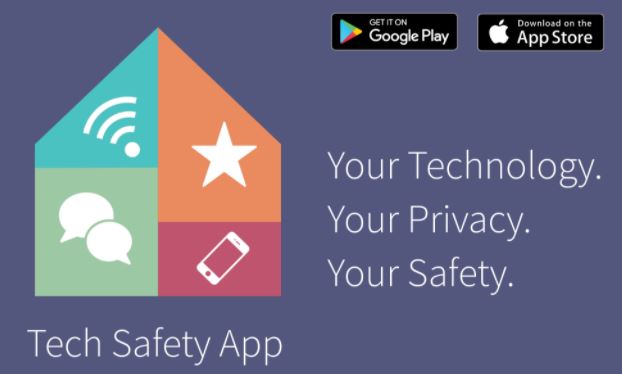
Tech Safety
“Computers, tablets, phones, apps, and social network sites impact how we connect to the world every day. They can offer help, valuable resources, and support if you are experiencing domestic violence or stalking. As you use technology and plan for your safety in these situations, it is also important to be aware of the risks. The information below can help you to use technology in more informed, safer ways. These tips provide suggestions for you to be aware of. But you are the only one who can decide what is best for you and your safety.”
https://www.safehorizon.org/tech-and-cyber-safety/
- English and Spanish
- Online Safety
- Networking Safely on Social Media
- Phone Safety
You can download Tech Safety Tips in English and Spanish.
Online Safety (for Teens) – Nemours KidsHealth
(kidshealth.org/en/teens/internet-safety.html)

KEEPING CHILDREN SAFE ONLINE
(US Dept of Justice)
From Keeping Children Safe Online (justice.gov)
“Due to COVID-19, kids and adults are online more than ever, often unsupervised in the same space.
“Help kids stay safe.”
“Parents should stay involved in their digital world, know the apps they use, use parental controls where possible, and block and report people who make them feel uncomfortable.
“Kids should talk with a trusted adult so they understand online risks, only chat with people they know, ensure their online accounts are private, block people they don’t know or trust, and trust their instinct—if something makes them feel uncomfortable, tell a trusted adult about it.
“Kids and parents should stay alert—people aren’t always who they seem in online environments where identity is easy to fake.
“Stay safe at home. Stay safe online.
“To report an online child sexual exploitation offense, call 911 or go to report.cybertip.org.”
For Parents, Family Members, Teachers, Educators, Young Adults & Teens
For More Information on Human Trafficking Awareness & Prevention
and
ONLINE SAFETY
https://youth.gov/youth-topics/trafficking-of-youth/the-problem
https://www.safehorizon.org/get-informed/human-trafficking-statistics-facts/#definition/
https://www.dosomething.org/us/facts/11-facts-about-human-trafficking
LGBTQ+ – https://polarisproject.org/
Survivor Care*Prevention Education*Strategic Collaboration with Adults – https://love146.org/
Short video explaining why children are most of the victims of trafficking – Hotline –
For Parents, Family Members, Teachers, Educators, Young Adults & Teens
For More Information on Human Trafficking Awareness & Prevention
and
ONLINE SAFETY
Frederick Douglass Initiative teaching awareness and prevention strategy to children in schools
https://www.covenanteyes.com/2016/01/22/porn-and-sex-trafficking-10-facts-from-the-experts/
Video in 10 Facts
in 56 Human Trafficking Facts
From 56 Human Trafficking Facts:
24. Sex traffickers often recruit children because not only are children more unsuspecting and vulnerable than adults, but there is also a high market demand for young victims. Traffickers target victims on the telephone, on the Internet, through friends, at the mall, and in after-school programs.[17]
28. Sex traffickers use a variety of ways to “condition” their victims, including subjecting them to starvation, rape, gang rape, physical abuse, beating, confinement, threats of violence toward the victim and victim’s family, forced drug use, and shame.[14]
49. The FBI estimates that over 100,000 children and young women are trafficked in America today. They range in age from nine to 19, with the average being age 11. Many victims are not just runaways or abandoned, but are from “good” families who are coerced by clever traffickers.[17]
52. Human trafficking victims face physical risks, such as drug and alcohol addiction, contracting STDs, sterility, miscarriages, forced abortions, vaginal and anal trauma, among others. Psychological effects include developing clinical depression, personality and dissociative disorders, suicidal tendencies, Post-Traumatic Stress Syndrome, and Complex Post-Traumatic Stress Syndrome.[14]
Shared Hope
- Influencing Federal and State Policy
- Victim’s Access to Services
- Ending Demand
- Combating Child Sex Trafficking Online
- Domestic Minor Sex Trafficking Research
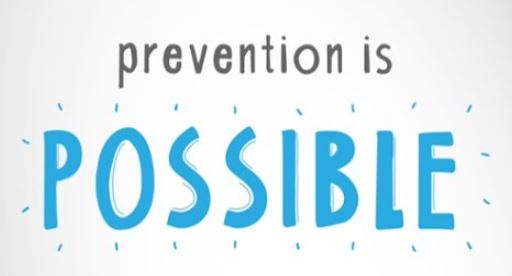
Additional Resources
- Advocates and Shelters | WomensLaw.org (drop-down menu for your State)
- Click here to enter your zip code: Find Domestic Violence and Abuse Help, Information and Stats (domesticshelters.org)
Domestic Violence Support | The National Domestic Violence Hotline (thehotline.org)
- National Organizations | WomensLaw.org (listed by subject matter)
- Chat Rooms and Message Boards | WomensLaw.org
- VictimConnect (serves victims of crime in US (including assault, abuse, domestic violence, teen dating violence, trafficking, stalking, etc.), and make local referrals.
Mental Health Resources
